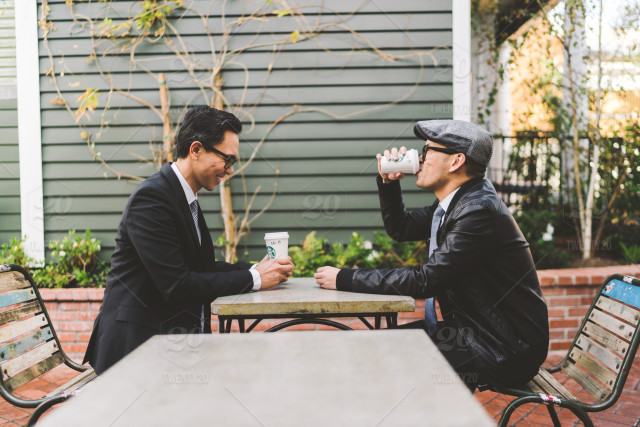Is there a particular way that gays speak? According to the documentary, yes there is. ‘Do I Sound Gay?’ examines David Thorpe in his quest to sound ‘less gay’, addressing the stereotypical features of gay speech. The documentary also raises the question of where this ‘gay voice’ come from. Was it in their nature since birth, or something birthed out of influence from their environment? The documentary focuses on how one’s speech features causes people to see them as ‘gay’, however, critiques have pointed out that people look not only at the way one speaks to judge if they are in fact, ‘gay’. And most importantly, is the ‘gay voice’ something that needs to be ‘cured’?
David Thorpe in ‘Do I Sound Gay?’ visits a speech therapist, seemingly disturbed by his own speech habits and wanting to change the ‘gay’ features in his speech. Some stereotypical features of gay speech addressed in the video includes hyperarticulated consonants like ‘p’s, ‘t’s, ‘k’s and ‘s’s, uptalk, stressed vowels as well as creaky voice (Rendall, Vasey & McKenzie, 2007). However, who determined that these features are ‘gay’? Could it be because these are features of female speech? However so, as seen in the documentary, there are gays who do not speak in that manner, and at the same time, there are straight men who possess those ‘gay’ features in their speech. Therefore, these speech features do not directly indicate if someone is gay. According to a research by Delvaux and Soquet in 2007, one’s manner of speech can be influenced by their environment, and it is often through subconscious imitation that they obtain certain features in their speech. A straight male raised in a female-dominated environment could possess these ‘gay’ speech features even though they are heterosexual. Therefore, the manner of speech is not an accurate representation of one’s sexuality, unlike how it has been presented in the documentary.
In the film, David’s best friend mentioned that he did not use to speak with the ‘gay features’ in the past, and that he used to sound like a ‘normal’ straight male. It was only when David started to identify as being homosexual that he developed these ‘gay’ features in his speech, to which his best friend thought that he was trying to perform the role of a homosexual. However, is the manner of one’s speech really merely a conscious performance of identity? In fact, in the film, David Thorpe said that he did not even notice his own change in speech, and insisted that it was not a conscious decision that he made to intentionally sound like a stereotypical gay. Just like in Cameron and Kulick’s Language and Sexuality, David’s manner of speech could be due to unconscious psychological reasons, which would explain why the subject himself does not even notice that his manner of speech is marked. It is possible that he subconsciously changed the way he spoke to let others be aware that he is gay, or perhaps to fit into the in-group of the gay community.
In the opening scenes of the documentary, we see David Thorpe going on the streets, asking random passers-by if he ‘sounds’ gay, to which most people answered that yes, he does sound gay. While the question itself is asking about his speech mannerisms, it is inevitable that the responses of the passers-by are affected by the other telltale signs that they see. For example, other aspects such as David’s mannerisms, behavior and fashion could also giveaway signs of his sexuality, affecting the perceptions that these passers-by could have of whether or not he is gay, or rather, if he ‘sounds’ gay (Clarke & Turner, 2007). While these other features are usually also stereotypical and cannot be a hundred percent accurate, a combination of these various aspects that we can perceive helps one to determine and form a judgement of whether or not someone is gay. However, the documentary ‘Do I Sound Gay’ fails to take these other aspects into account. A critical film review by The New York Times wrote that the film was not able to address why there is a stereotype for gay men because it focused only on voices and ‘ignores overall behavior’. The film therefore touches only on a very small aspect of the perception of ‘gay-ness’, and does not present how things really are in the real world, where there are many other factors that people take into account to tell if someone is gay.
Throughout the documentary, we see David Thorpe in his attempt to get rid of the gay features in his voice. However, is this ‘gay voice’ really something that needs to be ‘cured’? A critical review of the film by Conner argues that this ‘queer voice’ is not something that is required to be changed, and he feels pity for David in the film who ‘deeply resent(s) a part of himself’. Why is David’s manner of speech ‘wrong’? Why does he have to work so hard to change the way he speaks as if it were something to be ashamed of? As linguists, we know that there is no ‘right’ or ‘wrong’ way of speaking – they are merely different. The way that the film presents this issue was as if having the ‘gay features’ in your speech was bad and required treatment to change, to which many critical reviews of the documentary had argued otherwise. However so, we can understand David Thorpe’s concerns and his reasons as to why he wanted to get rid of these features in his speech. After being dumped by his ex-boyfriend for sounding ‘too gay’, he would of course perceive these speech features as bad and he would want to sound more masculine to prevent any such negative judgements of him in the future.
This documentary presents a very subjective point of view towards the features in the speech of gays. While it speaks the heart of many, others have disagreed with the points of view presented in the film. A bold film that touches on the stereotypical features of gay speech, ‘Do I Sound Gay?’ is a documentary that sparked many debates and criticisms, and pushed its viewers to think about this issue in their own cultures and societies.
REFERENCES
Cameron, D., Kulick, D. (2007). Language and Sexuality. Retrieved from https://antro-ling.wikispaces.com/file/view/Kulick+Language+and+Sexuality.pdf
Clarke, V., & Turner, K. (2007). Clothes Maketh the Queer? Dress, Appearance and the construction of Lesbian, Gay and Bisexual Identities. Retrieved from http://journals.sagepub.com.ezlibproxy1.ntu.edu.sg/doi/pdf/10.1177/0959353507076561
Conner, D. M. (2015, November 19). Queer Voices: Do I Sound Gay? Does It Matter? Retrieved from https://www.huffingtonpost.com/david-michael-conner/queer-voices-do-i-sound-g_b_8581772.html
Delvaux, V., & Soquet, A. (2007). The influence of ambient speech on adult speech productions through unintentional imitation. Phonetica, 64(2-3), 145-173.
Holden, S. (2015, July 9). Review: ‘Do I Sound Gay?’ Examines a Manner of Speaking. Retrieved from https://www.nytimes.com/2015/07/10/movies/review-do-i-sound-gay-examines-a-manner-of-speaking.html
Rendall, D., Vasey, P. L., McKenzie, J. (2007). The Queen’s English: An Alternative, Biosocial Hypothesis for the Distinctive Features of “Gay Speech”. Retrieved from https://link-springer-com.ezlibproxy1.ntu.edu.sg/article/10.1007%2Fs10508-007-9269-x

